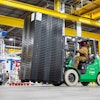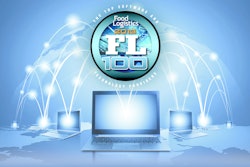The United Nations Environment Program Roundtable on Eco-innovation, organized by the European Commission and the UN Environment Program last month, discussed the need to invest in research and technology that will increase resource efficiency and cut waste in food production and consumption. Sustainable practices in food production and consumption, now taking root in some developing economies in Asia, need to be adopted region-wide to ensure adequate food supply and reduce farming’s environmental impact, according to a forum on eco-innovation.
“Adopting sustainable consumption and production was recognized by Asian countries as one of the means to address the dilemma between continuous improvement of standard of living and protecting the vulnerable ecosystems and deteriorating natural resources,” Han Shi, assistant professor in the public policy department of the City University of Hong Kong, told SciDev.Net.
Han, who spoke at the forum, says Asian consumption is growing on the back of increasing prosperity brought by rapid economic growth. But such consumption, he notes, has also increased demand for energy, water and packaging materials which can constrain resources in the long run.
“The new Asian rich can’t just copy the lifestyle of their Western predecessors,” Han says, adding that the current global patterns of consumption and production are “hitting the limits of global resources and ecosystem”.
According to the Food and Agricultural Organzation (FAO) about 30 per cent (equivalent to 1.3 billion tons) of food produced for human consumption in the world is lost or wasted. In Asia, the magnitude of such food loss and waste from harvest to retail varies from 32 per cent to 56 per cent. It says that rice, fruits and vegetables are considered “hotspots” of food wastage.
Such wastage contributes to greenhouse gas emission, says FAO which estimates that the carbon footprint of food produced and not eaten is equivalent to 3.3 gigatons of emissions — if it were a country it would be the third top emitter after United States and China.
Food wastage needs to be reduced especially in Asia where economic growth accompanied rising demand for meat and rice leads to higher carbon emissions, according to Dagmar Zwebe, sector leader for renewable energy at SNV Netherlands Development Organization.
Zwebe observes though that Asian policymakers, farmers and private sector are already implementing means to make food production more sustainable. She cites the growing interest on renewable energy like biogas, which is popular in China, Nepal and Vietnam.
Han also says eco-labeling, recycling and growing environmental awareness are helping Asia to promote a more sustainable consumption pattern.
“As eco-innovation remains a new idea in Asia, its wide uptake necessitates an enabling institutional environment, including correcting the undervaluation of environmental and social capital, reducing perverse economic incentives, and growing consumers’ preference for environmentally sound goods and services,” Han says.
Rosa Rolle, a senior officer at FAO’s regional office for Asia and the Pacific is suggesting the use of thinner packaging materials, biodegradable packaging and recyclable products such as aluminum and glass to reduce food packaging waste. Rolle also proposes the need for raising awareness, improving the knowledge base and skills of food chain stakeholders, and investing in technology development to support eco-innovation and promote resource efficiency.
To read more, click HERE.


















